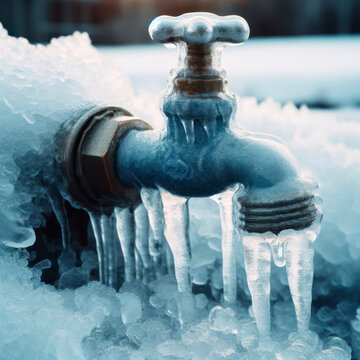The author is making several good points relating to Helpful Tips to Prevent Frozen Pipes this Winter as a whole in the article further down.

Cold weather can wreak havoc on your plumbing, specifically by freezing pipelines. Here's just how to stop it from taking place and what to do if it does.
Introduction
As temperatures decrease, the risk of frozen pipelines increases, possibly resulting in pricey fixings and water damages. Comprehending exactly how to prevent icy pipes is vital for homeowners in cool environments.
Comprehending Icy Pipelines
What causes pipelines to ice up?
Pipelines freeze when subjected to temperature levels listed below 32 ° F (0 ° C) for expanded periods. As water inside the pipes freezes, it expands, taxing the pipeline walls and potentially causing them to burst.
Dangers and damages
Frozen pipes can result in supply of water interruptions, property damages, and costly repair services. Ruptured pipes can flooding homes and trigger comprehensive structural damage.
Signs of Frozen Piping
Identifying icy pipes early can avoid them from breaking.
Exactly how to determine frozen pipes
Try to find decreased water circulation from faucets, unusual smells or noises from pipelines, and visible frost on revealed pipes.
Prevention Tips
Shielding susceptible pipes
Cover pipes in insulation sleeves or utilize heat tape to secure them from freezing temperature levels. Focus on pipelines in unheated or outside locations of the home.
Heating techniques
Maintain interior spaces effectively warmed, especially locations with pipes. Open up cupboard doors to enable warm air to distribute around pipes under sinks.
Protecting Outdoor Plumbing
Yard tubes and exterior taps
Detach and drain garden hoses prior to winter. Mount frost-proof spigots or cover outdoor faucets with shielded caps.
What to Do If Your Pipes Freeze
Immediate actions to take
If you believe frozen pipelines, maintain taps open up to eliminate stress as the ice thaws. Utilize a hairdryer or towels soaked in hot water to thaw pipelines slowly.
Long-Term Solutions
Architectural adjustments
Think about rerouting pipelines far from exterior walls or unheated locations. Include extra insulation to attics, cellars, and crawl spaces.
Updating insulation
Buy premium insulation for pipelines, attic rooms, and wall surfaces. Correct insulation helps maintain consistent temperatures and reduces the danger of icy pipes.
Final thought
Protecting against frozen pipelines calls for aggressive steps and quick reactions. By understanding the causes, indications, and safety nets, house owners can safeguard their plumbing during winter.
Helpful Tips to Prevent Frozen Pipes this Winter
UNDERSTANDING THE BASICS: WHY PIPES FREEZE AND WHY IT’S A PROBLEM
Water freezing inside pipes is common during the winter months, but understanding why pipes freeze, and the potential problems it can cause is crucial in preventing such incidents. This section will delve into the basics of why pipes freeze and the associated problems that may arise.
THE SCIENCE BEHIND FROZEN PIPES
When water reaches freezing temperatures, it undergoes a physical transformation and solidifies into ice. This expansion of water as it freezes is the primary reason pipes can burst. As the water inside the pipe freezes, it expands, creating immense pressure on the walls. If the pressure becomes too great, the pipe can crack or rupture, leading to leaks and water damage.
FACTORS THAT CONTRIBUTE TO PIPE FREEZING
Low Temperatures: Extremely cold weather, especially below freezing, increases the risk of pipes freezing. Uninsulated or Poorly Insulated Pipes: Pipes located in unheated areas, such as basements, crawl spaces, or attics, are more prone to freezing. Insufficient insulation or lack of insulation altogether exacerbates the problem. Exterior Wall Exposure: Pipes running along exterior walls are susceptible to freezing as they encounter colder temperatures outside. Lack of Heating or Temperature Regulation: Inadequate heating or inconsistent temperature control in your home can contribute to frozen pipes. PROBLEMS CAUSED BY FROZEN PIPES
- Pipe Bursting: As mentioned earlier, the expansion of water as it freezes can cause pipes to burst, resulting in significant water damage.
- Water Damage: When pipes burst, it can lead to flooding and water damage to your property, including walls, ceilings, flooring, and personal belongings.
- Structural Damage: Prolonged exposure to water from burst pipes can compromise the structural integrity of your home, leading to costly repairs.
- Mold and Mildew Growth: Excess moisture from water damage can create a favorable environment for mold and mildew growth, posing health risks to occupants.
- Disrupted Water Supply: Frozen pipes can also result in a complete or partial loss of water supply until the issue is resolved.
WHY CERTAIN PIPES ARE MORE PRONE TO FREEZING
- Location: Pipes located in unheated or poorly insulated areas, such as basements, crawl spaces, attics, or exterior walls, are at higher risk of freezing.
- Exterior Pipes: Outdoor pipes, such as those used for irrigation or exposed plumbing, are particularly vulnerable to freezing as they are directly exposed to the elements.
- Supply Lines: Pipes that carry water from the main water supply into your home, including the main water line, are critical to protect as freezing in these lines can affect your entire plumbing system.
- Underground Pipes: Pipes buried underground, such as those connected to sprinkler systems or outdoor faucets, can be susceptible to freezing if not properly insulated.
https://busybusy.com/blog/helpful-tips-to-prevent-frozen-pipes-this-winter/

Do you appreciate reading up on Prevent Frozen Pipes ? Leave a review down the page. We'd be delighted to see your insights about this write up. We are looking forward that you visit us again in the future. Sharing is caring. One never knows, you could be helping someone out. Thanks so much for your time invested reading it.
Call Today